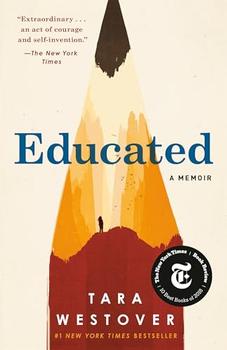Summary | Excerpt | Reading Guide | Reviews | Beyond the Book | Readalikes | Genres & Themes | Author Bio

A Memoir
by Tara Westover
At four I stood and put my boots by the back door. They were caked in manure, and I was sure Grandma wouldn't let them into her car. I pictured them on her porch, abandoned, while I ran off shoeless to Arizona.
I imagined what would happen when my family discovered I was missing. My brother Richard and I often spent whole days on the mountain, so it was likely no one would notice until sundown, when Richard came home for dinner and I didn't. I pictured my brothers pushing out the door to search for me. They'd try the junkyard first, hefting iron slabs in case some stray sheet of metal had shifted and pinned me. Then they'd move outward, sweeping the farm, crawling up trees and into the barn attic. Finally, they'd turn to the mountain.
It would be past dusk by then - that moment just before night sets in, when the landscape is visible only as darkness and lighter darkness, and you feel the world around you more than you see it. I imagined my brothers spreading over the mountain, searching the black forests. No one would talk; everyone's thoughts would be the same. Things could go horribly wrong on the mountain. Cliffs appeared suddenly. Feral horses, belonging to my grandfather, ran wild over thick banks of water hemlock, and there were more than a few rattlesnakes. We'd done this search before when a calf went missing from the barn. In the valley you'd find an injured animal; on the mountain, a dead one.
I imagined Mother standing by the back door, her eyes sweeping the dark ridge, when my father came home to tell her they hadn't found me. My sister, Audrey, would suggest that someone ask Grandma, and Mother would say Grandma had left that morning for Arizona. Those words would hang in the air for a moment, then everyone would know where I'd gone. I imagined my father's face, his dark eyes shrinking, his mouth clamping into a frown as he turned to my mother. "You think she chose to go?"
Low and sorrowful, his voice echoed. Then it was drowned out by echoes from another conjured remembrance - -crickets, then gunfire, then silence.
The event was a famous one, I would later learn - like Wounded Knee or Waco - but when my father first told us the story, it felt like no one in the world knew about it except us.
It began near the end of canning season, which other kids probably called "summer." My family always spent the warm months bottling fruit for storage, which Dad said we'd need in the Days of Abomination. One evening, Dad was uneasy when he came in from the junkyard. He paced the kitchen during dinner, hardly touching a bite. We had to get everything in order, he said. There was little time.
We spent the next day boiling and skinning peaches. By sundown we'd filled dozens of Mason jars, which were set out in perfect rows, still warm from the pressure cooker. Dad surveyed our work, counting the jars and muttering to himself, then he turned to Mother and said, "It's not enough."
That night Dad called a family meeting, and we gathered around the kitchen table, because it was wide and long, and could seat all of us. We had a right to know what we were up against, he said. He was standing at the head of the table; the rest of us perched on benches, studying the thick planks of red oak.
"There's a family not far from here," Dad said. "They're freedom fighters. They wouldn't let the Government brainwash their kids in them public schools, so the Feds came after them." Dad exhaled, long and slow. "The Feds surrounded the family's cabin, kept them locked in there for weeks, and when a hungry child, a little boy, snuck out to go hunting, the Feds shot him dead."
I scanned my brothers. I'd never seen fear on Luke's face before.
"They're still in the cabin," Dad said. "They keep the lights off, and they crawl on the floor, away from the doors and windows. I don't know how much food they got. Might be they'll starve before the Feds give up."
Excerpted from Educated by Tara Westover. Copyright © 2018 by Tara Westover. Excerpted by permission of Random House. All rights reserved. No part of this excerpt may be reproduced or reprinted without permission in writing from the publisher.
Your guide toexceptional books
BookBrowse seeks out and recommends the best in contemporary fiction and nonfiction—books that not only engage and entertain but also deepen our understanding of ourselves and the world around us.